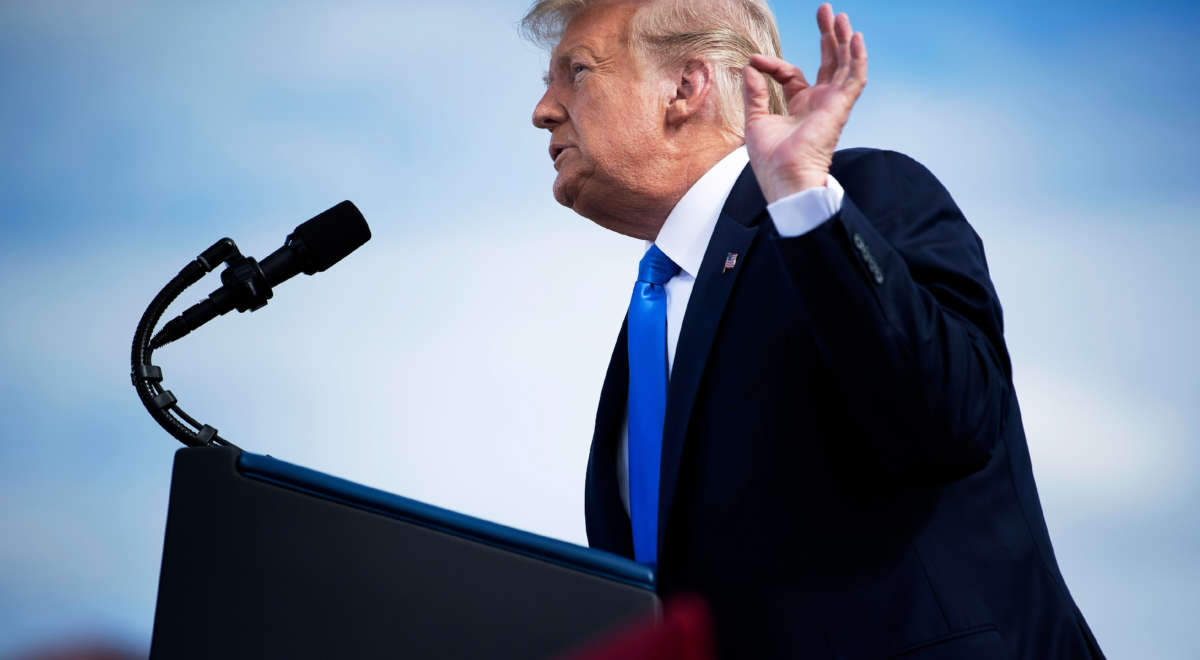Ten Democratic lawmakers are joining as plaintiffs in a lawsuit against former President Donald Trump over his role in the attack on the United States Capitol on January 6.
The lawsuit, filed earlier this year by Rep. Bennie Thompson (D-Mississippi) and the NAACP, is targeting Trump as well as his former lawyer Rudy Giuliani and two recognized hate groups, the Oath Keepers and the Proud Boys, by invoking a little-known law that was passed in the Reconstruction era.
The law, implemented to deal with the Ku Klux Klan at the time, allows civil litigation against anyone who uses “force, intimidation, or threat[s]” to prevent government officials from upholding their duties. The lawsuit makes the claim that’s exactly what Trump and his allies did up to and during the Capitol breach, which disrupted the certification of the Electoral College results.
Trump, Giuliani, and the other co-defendants “acted in concert to spearhead the assault on the Capitol while the angry mob that Defendants Trump and Giuliani incited descended on the Capitol,” the lawsuit alleges.
The 10 additional lawmakers, all Democrats, who are joining Thompson and the civil rights organization in the lawsuit hail from seven different states across the country. They include: Representatives Karen Bass, Maxine Waters and Barbara Lee from California; Rep. Steve Cohen of Tennessee; Rep. Bonnie Watson Coleman of New Jersey; Rep. Veronica Escobar from Texas; Rep. Hank Johnson from Georgia; Rep. Marcy Kaptur from Ohio; Rep. Jerry Nadler from New York; and Rep. Pramila Jayapal from Washington.
A press release from NAACP announcing the additional plaintiffs to the lawsuit stated these lawmakers “were all prevented from carrying out their constitutional duties to certify the 2020 presidential election due to the violent mob that had overtaken the Capitol.”
“The lawsuit seeks to use the justice system to hold Donald Trump, Rudy Giuliani and the violent white supremacists who participated in the insurrection accountable for their attack on democracy,” the organization added.
Several of the lawmakers now involved in the lawsuit placed direct blame on the former president for the violence that occurred at the Capitol complex that day.
“As I sat in my office on January 6th with rioters roaming the hallways, I feared for my life and thought I was going to die,” Representative Cohen said in a statement. “This invasion was a direct result of Donald Trump’s rhetoric and words.”
Aside from the current 11 members of Congress who are suing Trump and others for their role in the Capitol breach, a second lawsuit, filed by Rep. Eric Swalwell (D-California), was also filed in March. In addition to Trump and Giuliani, Swalwell’s litigation also names Rep. Mo Brooks (R-Alabama), who took part in the rousing speeches on January 6 prior to the attack on the Capitol, as a co-defendant.
Recent polling demonstrates that nearly three in five Americans believe Trump bears partial responsibility for the violence that took place that day. Multiple individuals were injured during the breach of the Capitol, and five individuals were killed as a result.
A terrifying moment. We appeal for your support.
In the last weeks, we have witnessed an authoritarian assault on communities in Minnesota and across the nation.
The need for truthful, grassroots reporting is urgent at this cataclysmic historical moment. Yet, Trump-aligned billionaires and other allies have taken over many legacy media outlets — the culmination of a decades-long campaign to place control of the narrative into the hands of the political right.
We refuse to let Trump’s blatant propaganda machine go unchecked. Untethered to corporate ownership or advertisers, Truthout remains fearless in our reporting and our determination to use journalism as a tool for justice.
But we need your help just to fund our basic expenses. Over 80 percent of Truthout’s funding comes from small individual donations from our community of readers, and over a third of our total budget is supported by recurring monthly donors.
Truthout has launched a fundraiser to add 500 new monthly donors in the next 10 days. Whether you can make a small monthly donation or a larger one-time gift, Truthout only works with your support.
